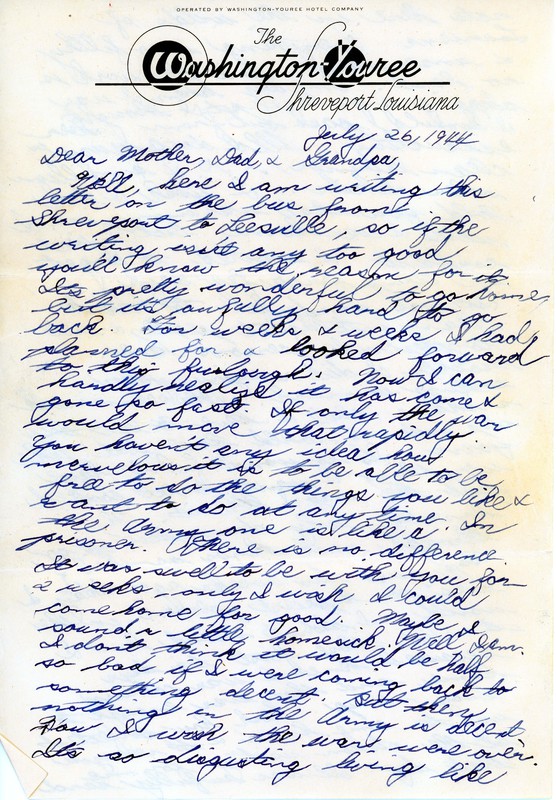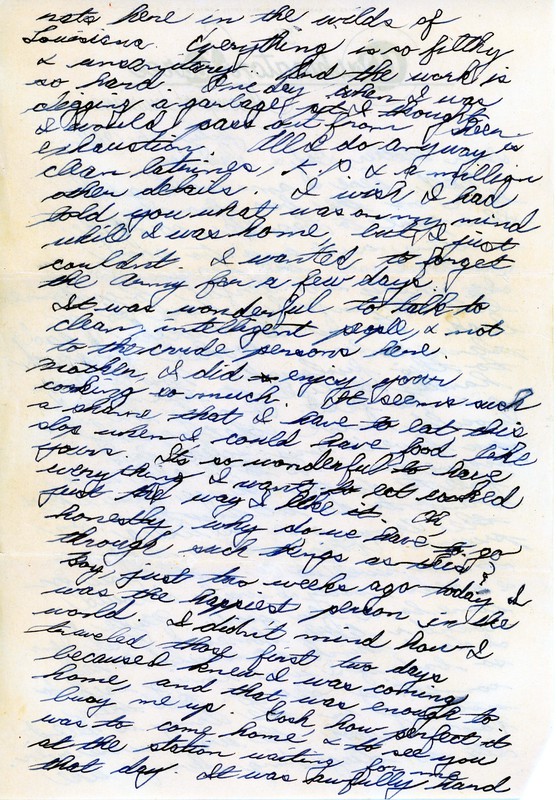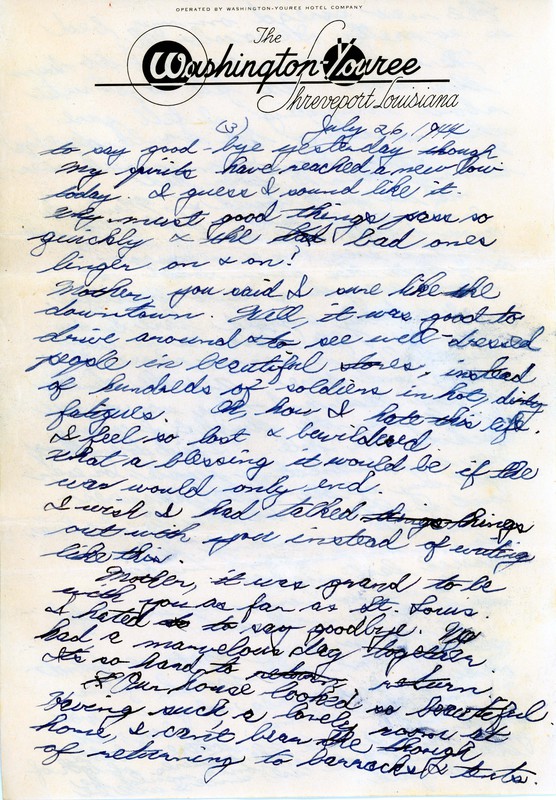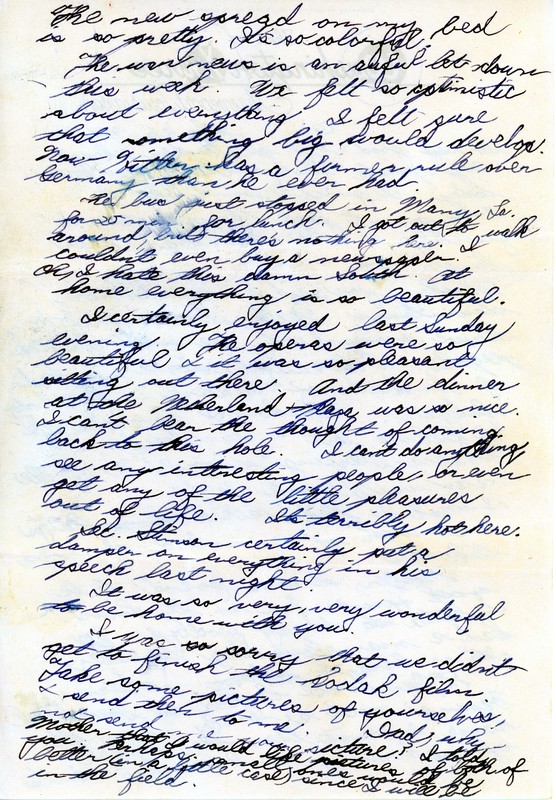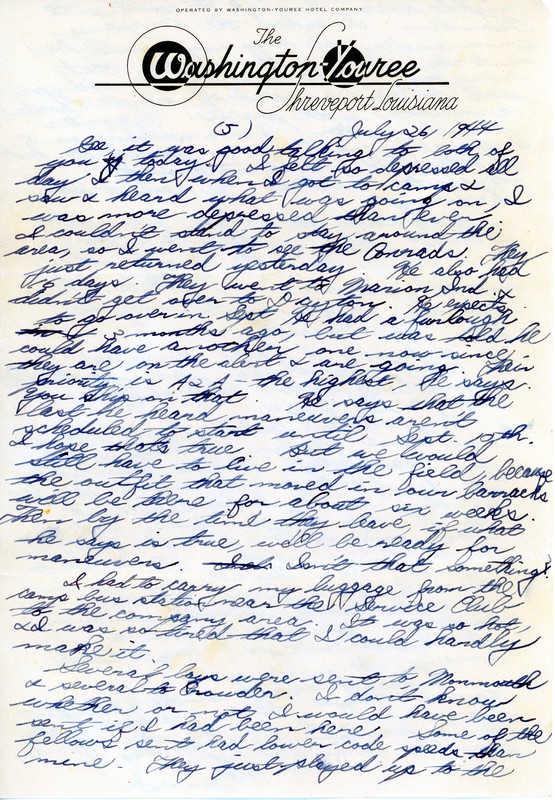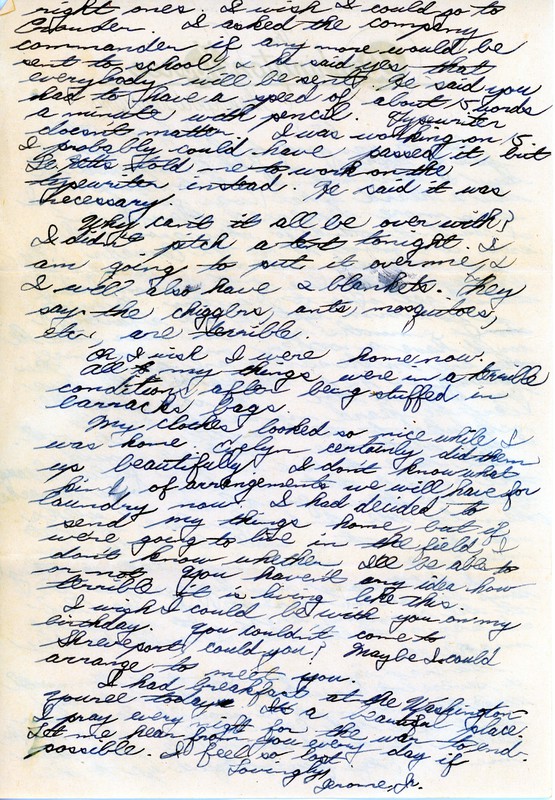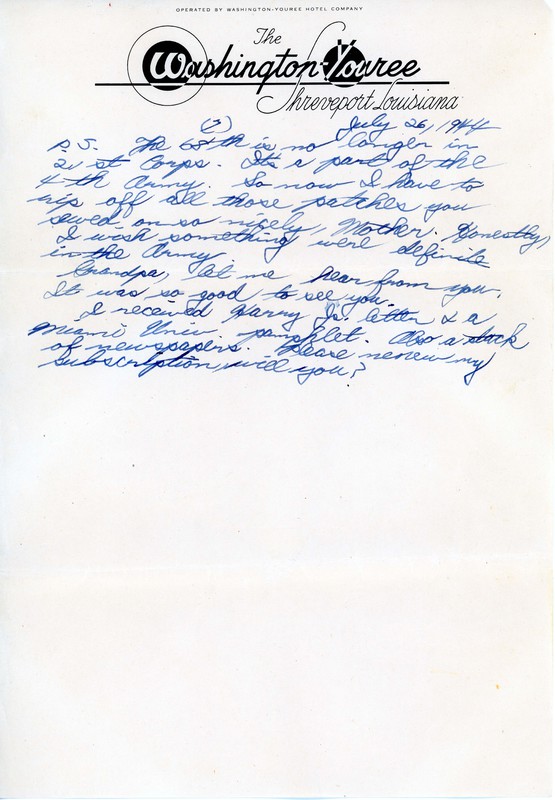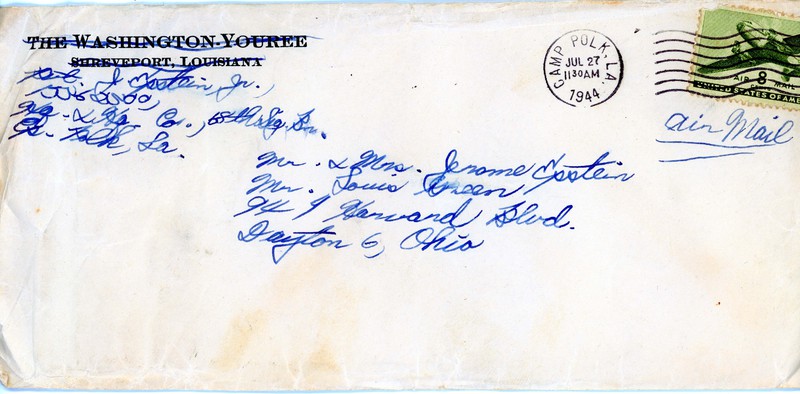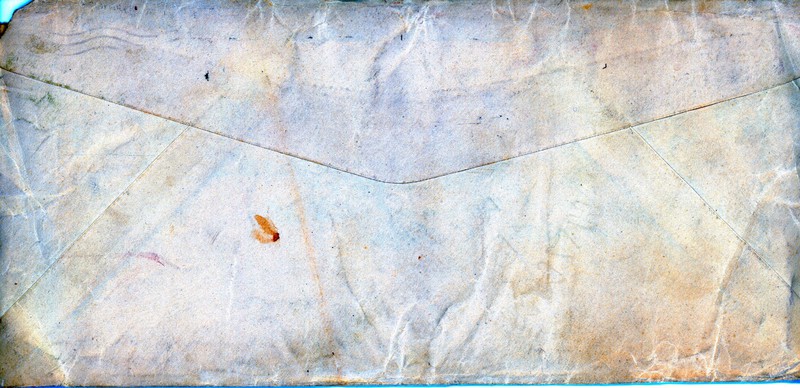July 26, 1944
Dear Mother, Dad, and Grandpa,
Well, here I am writing this letter on the bus from Shreveport to Leesville, so if the writing isn’t any too good you’ll know the reason for it. It’s pretty wonderful to go home, but it’s pretty awfully hard to go back. For weeks and weeks I had planned for and looked forward to this furlough. Now I can hardly realize it has come and gone so fast. If only the war would move that rapidly. You haven’t any idea how marvelous it is to be able to be free to do the things you like and want to do at any time. In the Army one is like a prisoner. There is no difference. It was swell to be with you for 2 weeks, only I wish I could come home for good. Maybe I sound a little homesick. Well I am. I don’t think it would be half so bad if I were coming back to something decent. But then nothing in the Army is decent. How I wish the war were over. It’s so disgusting living like
rats here in the wilds of Louisiana. Everything is so filthy and unsanitary! And the work is so hard. One day when I was digging a garbage pit and I thought I would pass out from sheer exhaustion. All I do any way is clean latrines, K.P. and a million other details. I wish I told you what was on my mind while I was home, but I just couldn’t. I wanted to forget the Army for a few days! It was wonderful to talk to clean, intelligent people, and not to the crude persons here. Mother, I did enjoy your cooking so much. It seems such a shame that I have to eat this slop when I could have food like yours. It’s so wonderful to have everything I want to eat cooked just the way I like it. Oh, honestly, why do we have to go through such things as this? Boy, just two weeks ago today I was the happiest person in the world. I didn’t mind how I traveled those first two days because I knew I was coming home, and that was enough to buoy me up. Gosh, how perfect it was to come home and to see you at the station waiting for me that day. It was awfully hard
to say good-bye yesterday though. My spirits have reached a new low today. I guess I sound like it. Why must good things pass so quickly and the bad bad ones linger on and on?
Mother, you said I sure like the downtown. Well, it was good to drive around and to see well dressed people in beautiful stores, instead of hundreds of soldiers in hot, dirty fatigues. Oh, how I hate this life. I feel so bad and bewildered. What a blessing it would be if the war would only end. I wish I had talked things things out with you instead of writing like this.
Mother, it was grand to be with you as far as St. Louis. I hated do to say goodbye. We had a marvelous stay together. It’s so hard to retur return.
T Our house looked so beautiful. Having such a lovely room at home, I can’t bear the thought of returning to barracks tents.
The new spread on my bed is so pretty. It’s so comfortable.
The war news is an awful let down this week. We felt so optimistic about everything. I felt sure that something big would develop. Now Hitler has a firmer rule over Germany than he ever had.[1]
The bus just stopped in Many, La. for 25 min. for lunch. I got out to walk around, but there’s nothing here. I couldn’t even buy a newspaper. Oh, I hate this damn South. At everything is so beautiful.
I certainly enjoyed last Sunday evening. The operas were so beautiful and it was so pleasant sitting out there. And the dinner at the Netherland Plaza was so nice. I can’t bear the thought of coming back to this hole. I can’t do anything, see anything interesting people, or even get any of the little pleasures out of life. It’s terribly hot here.
Sec. Stimson[2]certainly put a damper on everything in his speech last night.
It was so very, very wonderful to be home with you.
I was so sorry that we didn’t get to finish the Kodak films. Take some pictures of yourselves, and send them to me. God, why not send me your picture? I told Mother that I would like pictures of both of you. Perhaps small ones would be better (in a little case) since I will be in the field.
[1] Epstein is likely referring here to the crackdown that followed the failed assassination attempt on Hitler that occurred on July 20th, 1944. This was an attempt by Wehrmacht (German Army) Officers and others to remove Hitler and the Nazis from power and make peace with the Western Allies. In the wake of the failed attempt, over 7,000 suspected conspirators were arrested by the Gestapo, of whom roughly 4,980 were executed.
[2] Henry L. Stimpson was the Secretary of War during World War II.
Gee, it was good talking to both of you today. I felt so depressed all day and then when I got to camp and saw and heard what was going on, I was more depressed than ever. I couldn’t stand to stay around the area, so I went to see the Conrads. They just returned yesterday. He also had 16 days. They went to Marion Ind. and didn’t get over to Dayton. He expects to go over in Sept. He had a furlough in 3 months ago, but was told he could have another one now since they are on the alert and are going. Their priority is A2A – the highest, he says. You ship on that. He says that the last he heard maneuvers aren’t scheduled to start until Sept. 10th. I hope that’s true. But we would still have to live in the field, because the outfit that moved in our barracks will be there for about six weeks. Then by the time they leave if what he says is true, we’ll be ready for maneuvers. Isnt Isn’t that something?
I had to carry my luggage from the camp bus station near the Service Club to the company area. It was so hot and I was so tired that I could hardly make it.
Several boys were sent to Monmouth and several to Crowder. I don’t know whether or not I would have been sent if I had been here. Some of the fellows sent had lower code speeds than mine. They just played up to the
right ones. I wish I could go to Crowder. I asked the company commander if any more would be sent to school, and he said yes that everybody will be sent. He said you had to have a spiff of about 15 words a minute with pencil. Typewriter doesn’t matter. I was working on 15. I probably could have passed it, but Lt. Ketts told me to work on the typewriter instead. He said it was necessary.
Why can’t it all be over with? I didn’t pitch a tent tonight. I am going to put it over me and I will also have 2 blankets. They say the chiggers, ants, mosquitoes, etc., are terrible.
Oh, I wish I were home now.
All my things were in terrible condition after being stuffed in barracks bags.
My clothes looked so nice while I was home. Evelyn certainly did them up beautifully! I don’t know what kind of arrangement we will have for laundry now. I had decided to send my things home but if we’re going to live in the field I don’t know whether I’ll be able to or not. You haven’t any idea how terrible it is living like this.
I wish I could be with you on my birthday. You couldn’t come to Shreveport, could you? Maybe I could arrange to meet you. I had breakfast at the Washington-Yourree today. It’s a beautiful place. I pray every night for the war to end. Let me hear from you every day if possible. I feel so lost.
Lovingly,
Jerome, Jr.
P.S. The 68th is no longer in 21st Corps. It’s a part of the 4th Army. So now I have to rip off all of those patches you sewed on so nicely, Mother. Honestly, I wish something were definite in the Army.[1]
Grandpa, let me hear from you. It was so good to see you.
I received Harry Jr. letter and a Miami Univ. pamphlet. Also a stack of newspapers. Please renew my subscription, will you?
[1] During World War II the Army began the practice of wearing distinctive unit patches on the shoulders of both dress and field uniforms. Typically, this would be the patch of the Division the unit belonged to, but for specialist units like the 68th Signal Battalion that did not belong to a Division it could be a higher headquarters such as a Corps or Army.

